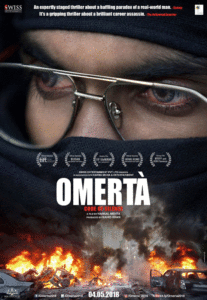Movie Review: OmertÃ
By Ally Adnan | Movies | Published 7 years ago
 Omertà tries hard to shock, thrill and engage, but fails miserably on all counts. Hansal Mehta’s feature film, based on the life of real-life terrorist Ahmed Omar Saeed Sheikh, is incredibly boring — and quite unnecessary. Coming from a director who made the exceptionally brilliant film, Shahid, in 2012, Omertà proves to be a total disappointment.
Omertà tries hard to shock, thrill and engage, but fails miserably on all counts. Hansal Mehta’s feature film, based on the life of real-life terrorist Ahmed Omar Saeed Sheikh, is incredibly boring — and quite unnecessary. Coming from a director who made the exceptionally brilliant film, Shahid, in 2012, Omertà proves to be a total disappointment.
Omertà fails for four primary reasons: a weak, disorderly screenplay; a desire to indulge current-era prejudices; a story that adds nothing to publicly available information; and a reluctance to examine and understand the life of one of the world’s most notorious criminals.
Mehta’s film cuts relentlessly between the past and the present, ostensibly to show two distinct phases in Sheikh’s life — one, in which he is a militant in training, and the other in which he is a hardened criminal. The constant shifts are both distracting and confusing. Aditya Warrior’s merciless editing does not help matters either. The sketchy story, attributed to actor-model Mukul Dev, is haphazard and chaotic. In the absence of the erstwhile collaborator-in-writing, Apurva Asrani, with whom he had a very public and acrimonious falling out, Mehta struggles to develop a coherent, structured screenplay.
Omertà tries to woo Indian and international audiences by indulging the prejudices of people influenced by the rhetoric of leaders like Narendra Modi and Donald Trump. Pandering to the audience’s views may help the film at the box office, but it comes at the cost of objectivity, accuracy and depth. The film unfolds on screen as an exposition of the collective viewpoint of an increasingly charged world and not as the story of an intelligent cold-hearted killer, who has wreaked havoc in the world.
Very little, if any, research appears to have gone into the making of Omertà . The events in Sheikh’s life are detailed faithfully, but the information presented in Omertà is a subset of that found easily on the net and, as a result, fails to inform or surprise.
Omertà is more interested in the facts of Sheikh’s life and not his truth. It plays out like a listicle — a faithful incident-by-incident account of the terrorist’s life — but without the requisite emotion. It does not make any attempt to deconstruct the man at the centre and examine his bone-chilling amorality. The reasons given for Sheikh’s moral devolution — fear, persecution, paranoia, purposelessness and lack of national identity — are generic and lack the specificity needed to bring the character alive. It is impossible to form an emotional connection with a person whose psychological makeup remains a mystery and, in the absence of the connection, his heinous actions fail to engage.
Rajkummar Rao, the wonderful actor from Shahid and Newton, tries very hard, but fails to do justice to the role of Ahmed Omar Saeed Sheikh. His sincere, but very visible, effort to act well makes for a drab performance, unrelieved by nuance, irony and depth. Mehta’s decision to frequently use real-life footage of Sheikh hurts Rao’s portrayal of the terrorist. Rao plays the terrorist differently from the person in the footage. The real-life Sheikh hides a menacing perversity behind his smirks; his calm demeanour conceals a chilling, cruel core. He seems to derive real pleasure from killing people. Rao’s Sheikh, on the other hand, is remarkably opaque. He kills by rote and with no obvious motives. His cold smiles are inscrutable. It is impossible to determine what, if any, pleasure he derives from committing acts of terror. A cold-hearted killer, who has been at the forefront of global terrorism for more than a quarter of a century, affords a truly fertile opportunity to actors essaying his character in cinema. Thanks mostly to a shallow screenplay, a perfunctory storyline and staccato direction, Rao is unable to seize the opportunity and add to his venerable actor’s resumé.
And while Rao’s performance in Omertà is lifeless, the film’s non-Indian actors, with the possible exception of Timothy Ryan Hickernell as Daniel Pearl, take the cake for turning in truly incompetent performances. It is painful to watch Blake Allan, Gerald Maliqi, Kallirroi Tziafeta, Chris Walters and the others play inadequately-written characters without conviction.
Ahmed Omar Saeed Sheikh’s is the story of a young man simultaneously empowered and weakened by his religion. It is sad — and surprising — that a director as gifted as Hansal Mehta does not have the ambition to make the intelligent, rousing film that the story deserves and settles for a very superficial film on one of the most interestingly complicated characters of our times.


